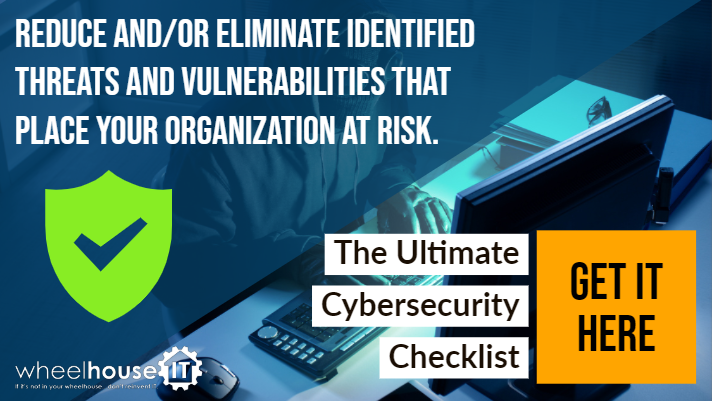So, you’ve heard about network audits and risk assessments and now you may be wondering, what exactly are they and do I even need them?
Are they ‘nice-to-haves’ or are they ‘must-haves’ in the world of business?
We get it. You’re busier than ever and every decision you make needs to have a purpose and an outcome.
Technology is an amazing tool that can empower businesses to thrive and scale to new heights. But with that comes other risks that a business leader needs to be aware of to maintain progress.
If you’re a business, especially a small or medium business, you CANNOT afford to ride the ‘ignorance is bliss’ train. In fact, small businesses are the ‘sweet spot’ for cybercriminals and in 2018 took up roughly 60% of all cyber attacks.
Before engaging with any of our clients, the first step of our process is to analyze and accurately understand where they stand today in their security measures. Although this is a crucial step in the process, many wonder what this actually means.
And that is why today we will look ‘underneath the hood’ for what a network audit and risk assessment include.
What is a Network Audit and Risk Assessment?
A network audit and risk assessment is simply a process used to evaluate your IT infrastructure and security. It evaluates the current processes used by your business and the performance of your network system and even takes a look into your IT management.
The assessment is conducted using specific analysis tools that are able to identify and generate a report on gaps that could be problematic to your business health.
Goals of the Audit
The goal of an audit is to identify and address problems for your company. Some examples of when you may consider the audit include:
- When you are not certain about what parts of your infrastructure handle what tasks
- When your network is not working effectively
- When you have concerns about a virus or malware
- When you are working on a strategic plan for the future
A risk assessment also identifies potential security risks. Large businesses that have their own IT departments and teams to monitor for these things are not as prone to attack as smaller businesses that often do not know or understand the importance of network security.
By getting an assessment and auditing your network, you’ll be able to clarify the areas with the highest risk and take measures to improve the situation. Overall, an audit gives you the power to make informed decisions about your business network.
What We’ve Seen With Our Clients
Here’s some shocking feedback. In our personal experience here at WheelHouse IT, after conducting hundreds of audits over the years, we’ve only had a handful of businesses score in the 60-70% range. The majority fell into the 80-90% range. This is BAD.
You ideally want to be as close to 0% as possible. 80-90% leaves you highly susceptible to a data breach and all the serious consequences that can come with it, especially if you are in the financial, healthcare, or legal industries.
What the Assessment Includes
The goal of a network assessment is to look at various aspects of the company’s IT infrastructure and clarify the current way it is being used by the company. It finds weaknesses or problems, as well as inefficiencies that may slow down your company’s progress.
A risk assessment looks at vulnerabilities in your network. Some common vulnerabilities include:
- Application Security (Productivity tools, Enterprise Resource Planning (ERP) CRM, Virtual Machine (VM) software, Web-based applications)
- Passwords
- Excessive User Access
- Workstation Security
- Wi-Fi Networks
The goal of a risk assessment is to find potential vulnerabilities before it allows a hacker or virus to cause problems for your business. We use the assessment to find appropriate solutions for security concerns.
Why is it Important?
A risk assessment and a network audit are important to protect your company from outside threats. It helps you find problems before you have a data breach and gives you a chance to shield your business from the worst situations.
To put it another way, ask yourself these questions.
If you were locked out of your data, be it patient records, financial records, or legal case files, etc; would you be able to afford to spend tens or hundreds of thousands of dollars to get that data back?
What would happen to the reputation of your business if this data was sold in the black market? This is often what happens if you decide not to pay up. This can also happen even if you do decide to pay up. Hackers find a way to sell the data and make money anyway.

Consequences of Security Breaches
In certain industries, like healthcare, a doctor’s office could be fined between 700k – 1 million+ for a breach. If HIPPA does an investigation and finds out that the doctor did not put the proper security measures in place, they will consider this to be negligence to sensitive patient data. This kind of fine can easily put a doctor’s practice out of business.
60 percent of small companies go out of business within six months of a cyber attack.
Do not let this be you. Know your risks.
Who Needs the Audit and Assessment?
As a general rule, all small businesses and growing companies need a network audit and risk assessment. If your business uses technology, then you need the assessment to clarify the potential problems that may arise.
Technology that may be used in a company and require an audit include:
- Computers
- Tablets
- Smartphones
- A server dedicated to your business needs
- Specialized tools for your industry (accounting platforms, modern printers, scanners, and other office technology)
If your company uses any technology, then you need to keep up with security measures. An audit gives you the chance to organize your system infrastructure while an assessment helps you clarify the risks to your business.
Risks of Waiting
Putting off an audit keeps you in the dark and exponentially increases your risk of the consequences.
The common problems that may arise include:
- Outdated operating systems, software, or hardware that is no longer supported can and will open you up to security risks
- Your data can be breached by a hacker
- Attacks from viruses, malware or ransomware can cripple your systems
Small businesses have a high risk of attack when compared to large companies. The primary reason is the possibility of the company having few security measures to protect customer data. A network audit and risk assessment provides you the chance to improve your IT security and reduce the risks to your business.
How to Get a Network Audit and Risk Assessment
Getting your network audited and assessed for risk will help you be proactive about protecting your company and maintaining progress.
It helps you identify security risks and find problems within your current infrastructure that is slowing down your business productivity. It allows you to make an informed decision about what to do for your IT security.
When you are ready to consider an audit or risk assessment, our team is available to help make it happen!
We have decades of experience and a dedicated team that loves what they do. We offer a comprehensive evaluation of your network system and arm you with the information you need to be prepared for any situation. This analysis, audit report and our professional recommendations are yours to keep. You can decide on the next steps that make sense for you.
However, if you were to hire us as your outsourced technology partner, we will help you develop a realistic plan of action to mitigate these risks and protect your business.
Have any outstanding questions? We’re happy to help.
{{cta(‘595acbb4-a934-4780-8365-d8518d22aac6′,’justifycenter’)}}









.jpeg)





